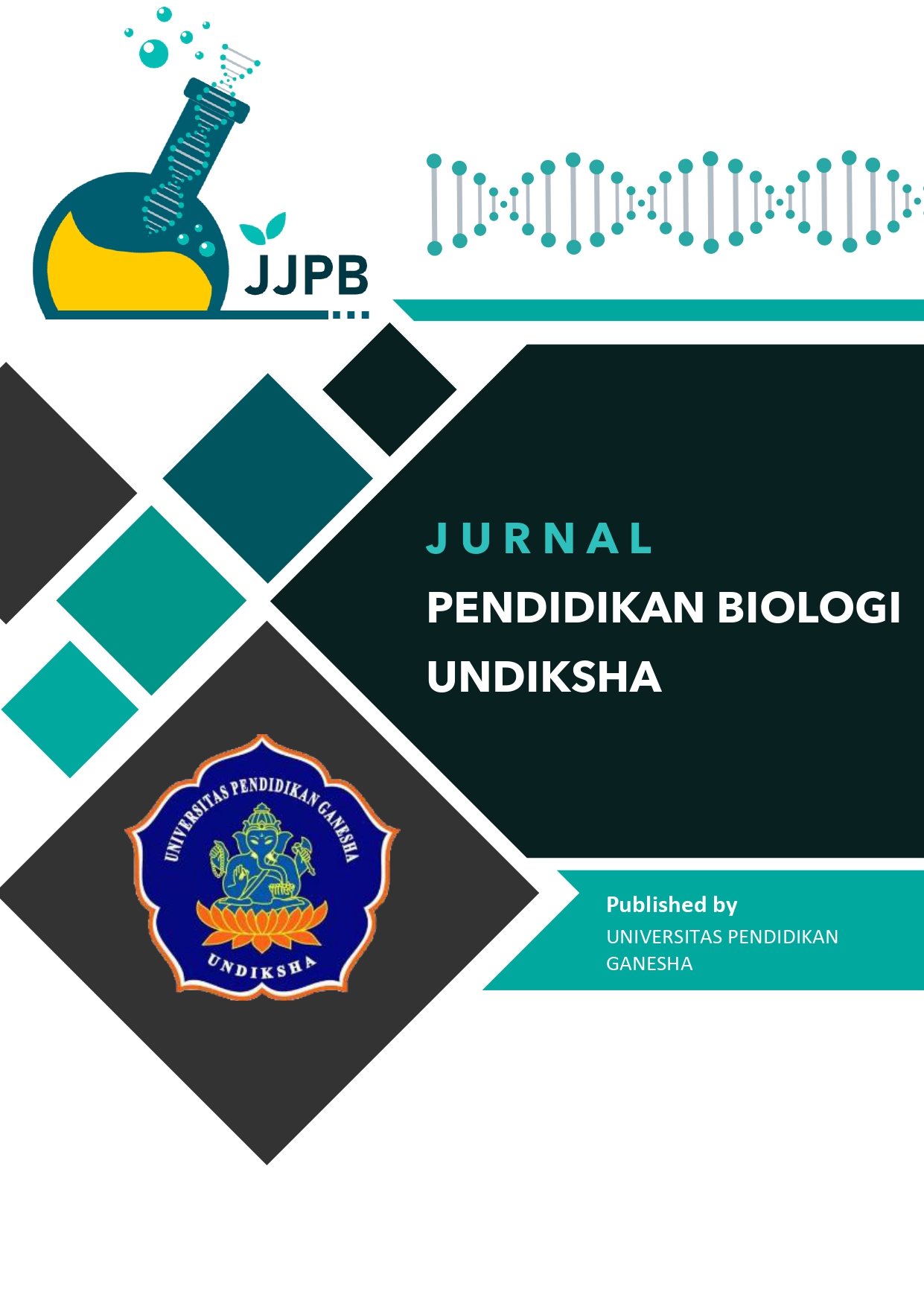Penerapan Model Project Based Learning terhadap Keterampilan Berpikir Kritis dan Keterampilan Kolaborasi pada Pembelajaran Biologi Kelas XII
Abstract
The purpose of this study was to determine the effect of the project-based learning model on critical thinking skills and collaboration skills in biotechnology material in class XII MIPA SMA Negeri 1 Taraju. This study uses a quantitative approach with a quasi-experimental method. The research population was all class XII MIPA, namely 127 students. With the sampling technique that is purposive sampling so that a sample of 64 people is obtained. The instrument consists of test instruments and non-test instruments. The test is in the form of 16 essay questions to measure critical thinking skills. The non-test is in the form of 24 statement items in the form of a questionnaire to measure collaboration skills. The data analysis technique uses the ANOVA test. The results of this study indicate that there is an influence of the project-based learning model on critical thinking skills and collaboration skills indicated by a significance value of less than 0.05, which is equal to 0.00. So, it can be concluded that there is an influence of the project-based learning model on students' critical thinking skills and collaboration skills in biotechnology material in class XII MIPA SMA Negeri 1 Taraju even semester of the 2022/2023 academic year.
References
Afriana, J. (2015). Project Based Learning.
Andriani, R., Zulhelmi, & Azizahwati. (2015). Differences of Student Attitude in Collaboration Based on Gender in Physics by Using Collaborative Learning Model in 10th Grade Madrasah Aliyah al Ihsan Boarding School Kampar.
Ching, D. A. (2020). Two Cubed Approach in a Collaborative Classroom and the Enhanced Algebra and Social Skills of College Students. Universal Journal of Educational Research, 8(10), 4920–4930. https://doi.org/10.13189/ujer.2020.081064
Ennis, R. H. (1985). Critical Thinking and the Curriculum. National Forum: Phi Kappa Phi Journal, 65(1), 28–31.
Fadhilah, & Rahmawati, R. (2022). Model Project Based Learning dalam Meningkatkan Kemampuan Kerjasama di TK IT Aljannah. 4(1).
Fithrotunnisa, A. (2017). Pengembangan Pembelajaran Kolaboratif untuk Meningkatkan Karakter Saling Menghargai Siswa SD.
Fitriani, L., & Istianti, T. (2017). Penerapan Model Project Based Learning Untuk Meningkatkan Kemampuan Berpikir Kritis Siswa Pada Pemvelajaran IPS SD. Antologi UPI, 5(1), 521–529.
Gokhale, A. A. (1995). Collaborative Learning Enhances Critical Thinking. Journal of Technology Education, 7(1), 1–9.
Greenstein, L. (2012). Assessing 21st Century Skills: A Guide to Evaluating Mastery and Authentic Learning. In Corwin Press. Corwin Press.
Jefriza, Aima, Z., & Lovia, L. (2021). Analisis Kesalahan Siswa dalam Menyelesaikan Soal Cerita Siswa Kelas X IPS. Journal of Mathematic Education and Applied, 1(2).
Khairani Astri, E., Siburian, J., & Hariyadi, B. (2022). Pengaruh Model Project Based Learning terhadap Keterampilan Berpikir Kritis dan Berkomunikasi Peserta Didik. Biodik, 8(1), 51–59. https://doi.org/10.22437/bio.v8i1.16061
Muiz, A., Wilujeng, I., Jumadi, & Senam. (2016). Implementasi Model Susan Loucks-Horsley Terhadap Communication and Collaboration Peserta Didik SMP. Unnes Science Education Journal, 5(1), 1079–1084.
Mulyati, N. S. (2021). Analisis Penggunaan Model Project BasedLearning (PjBL) terhadap Hasil Belajar Matematika Siswa Sekolah Dasar.
Panjaitan, D. T. (2020). Pengaruh Model Project Based Learning terhadap keterampilan Critical Thinking, Creative Thinking, Collaboration & Communication (4C) Siswa di SMA.
Rahayu, S., Pramiasih, E. E., & Sritumini, B. A. (2019). Pengaruh Model Project Based Learning Terhadap Peningkatan Kemampuan Kolaborasi Siswa Dalam Mata Pelajaran Ekonomi Bisnis. Jurnal Pendidikan: Teori, Penelitian, Dan Pengembangan, 5(2), 132–143. http://jurnal.fkip.unla.ac.id/index.php/jp2ea/article/view/330
Rahman, A., Rifqiawati, I., Damayanti, S., Lestari, I. D., & Usman. (2021). Profil Pengembangan Critical Thinking Skills melalui Pembelajaran Scientific Approach di Provinsi Banten. Jurnal Pendidikan Biologi Undiksha, 8(1), 7–18. https://ejournal.undiksha.ac.id/index.php/JJPB/article/view/31631
Redecker, C., Leis, M., Leendertse, M., Punie, Y., Gijsbers, G., Kirschner, P., Stoyanov, S., & Hoogveld, B. (2011). The Future of Learning: Preparing for Change. In Publications Office of the European Union. http://ipts.jrc.ec.europa.eu/publications/pub.cfm?id=4719
Redhana, I. W. (2019). Mengembangkan Keterampilan Abad Ke-21 Dalam Pembelajaran Kimia. Jurnal Inovasi Pendidikan Kimia, 13(1).
Retnowati, D., Ali, M., & Lestari, S. (2010). Peningkatan Sikap Saling Menghargai pada Anak Usia 5-6 Tahun di PAUD Aisyiyah Melawi.
Sugiyono. (2014). Metode Penelitian Pendidikan Pendekatan Kuantitatif, Kualitatif dan R & D. Alfabeta.
Warsita, A. N., Nurjhani, M., & Shintawati, R. (2018). Hubungan PenguasaanKonsep dengan Kemampuan Menilai Kredibilitas Sumber Informasi Menggunakan Problem Based Learning (PBL) pada Materi Pencemaran Lingkungan. Indonesian Journal of Biology Education, 1(1), 1–7.
Wulandari, D. D., Adnyana, P. B., & Santiasa, I. M. P. A. (2020). Penerapan E-Modul Interaktif terhadap Motivasi dan Hasil Belajar Siswa pada Pembelajaran Biologi Kelas X. Jurnal Pendidikan Biologi Undiksha, 7(2), 66–80. https://ejournal.undiksha.ac.id/index.php/JJPB/index
Downloads
Published
Issue
Section
License
Copyright (c) 2023 Jurnal Pendidikan Biologi Undiksha

This work is licensed under a Creative Commons Attribution-ShareAlike 4.0 International License.







